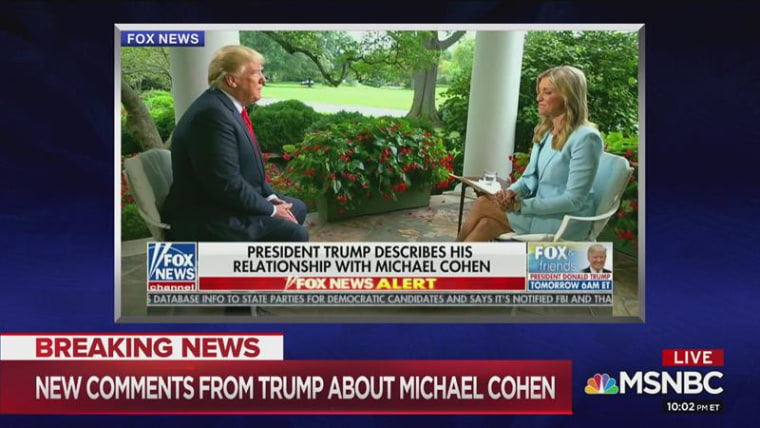The more Donald Trump and people around him have confronted legal jeopardy, the more the president has been eager to lash out at law enforcement as a political enemy. The Republican may have talked about "law and order" on the campaign trail, but that was before he became the subject of a criminal investigation.
In his latest Fox News interview, however, Trump went a little further, questioning the legality of a routine law-enforcement tool.
Mr. Trump said the years in prison facing his longtime attorney, Michael D. Cohen, for bank fraud were too daunting, and "in all fairness to him, most people are going to do that.""I know all about flipping. For 30, 40 years I have been watching flippers," Mr. Trump said on Wednesday during an interview with "Fox & Friends" that aired on Thursday."But if you can say something bad about Donald Trump and you will go down to two years or three years, which is the deal he made, in all fairness to him, most people are going to do that," Mr. Trump said of Mr. Cohen. "And I have seen it many times. I have had many friends involved in this stuff. It's called flipping and it almost ought to be illegal."
Trump added that the practice "almost ought to be outlawed," because "it's not fair."
All joking aside, I don't think I've ever heard a politician condemn this standard prosecutorial tactic.
Whether Trump understands this or not, law enforcement routinely employs this practice against large criminal enterprises -- from organized crime to crooked corporations -- and for good reason.
Consider a drug cartel, for example. Let's say the police arrest a low-level drug dealer, and they have more than enough evidence to lock him up. There may certainly be some value to that, but the police know that some other low-level drug dealer will quickly take his place. To make a real difference -- to maximize the societal impact -- law enforcement officials want to target his bosses and their bosses. The higher up they can go, the more effective they'll be.
In order to do that, the police will try to "flip" the low man on the totem pole, offering a reduced sentence in exchange for cooperation, with the hopes of undermining a larger criminal operation.
Trump not only believes this isn't "fair"; he also believes the entire practice, routinely used in criminal investigations, perhaps should be "outlawed."
There's no reason to believe Trump will succeed in actually making "flipping" illegal, but the fact that the sitting president of the United States spoke publicly about undermining his own country's criminal-justice system is ... different.
Update: NBC News' Benjy Sarlin joked this morning, "I’m sure the next prosecutor to hear the defense tell jurors 'even the president says this should be illegal' is going to be just psyched about the law-and-order presidency."
